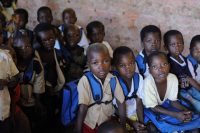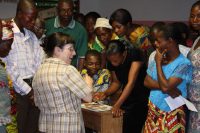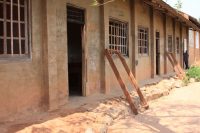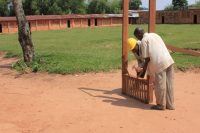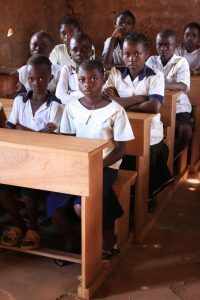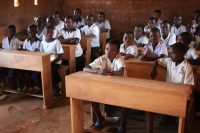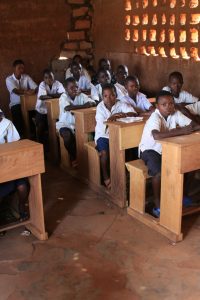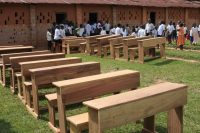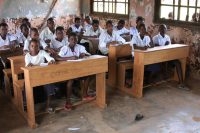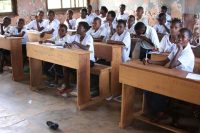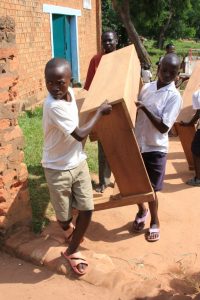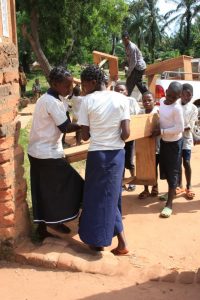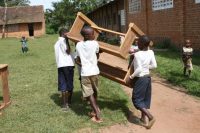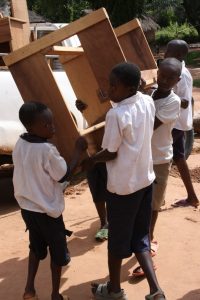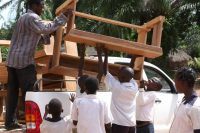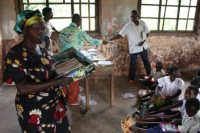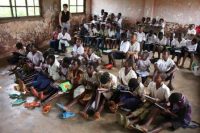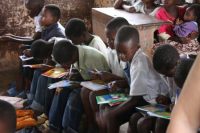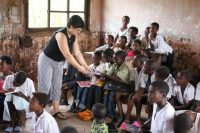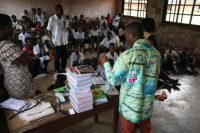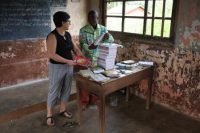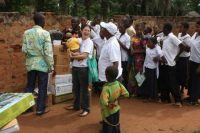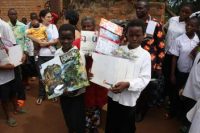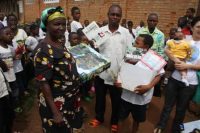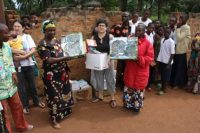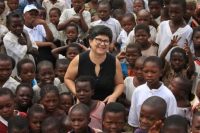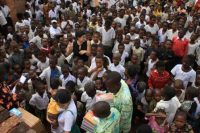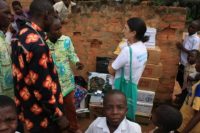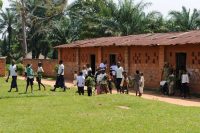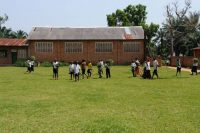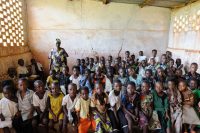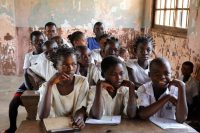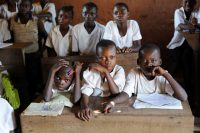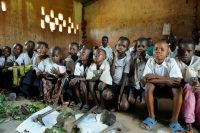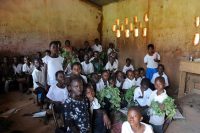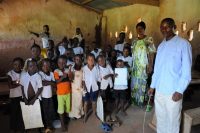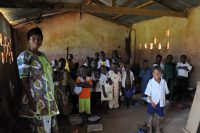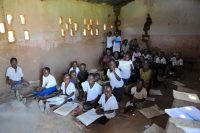Project Description
The Situation
The Lubala elementary school is a Catholic special agreement school in the village of Tshimbulu (Western Kasai region) in the Democratic Republic of Congo (DRC). In the DRC there are three types of schools: State schools, special agreement schools, and private schools. State schools are built by the State and depend entirely on it; special agreement schools are built by private bodies (usually religious bodies) which take care of staff recruitment and the management of the school, while the wages are paid by the State; private schools are built, managed and funded entirely by private bodies. The State recognizes them and the diplomas they issue.
Given the extreme poverty and political instability of the Democratic Republic of Congo, most schools are special agreement schools.
The village of Tshimbulu is in the Western Kasai region, a rather quiet region if compared with the Kivu region, where rebels of different factions are still engaged in an armed fight against the central government. The majority of the population (estimated at 10,000 people) is dedicated to agriculture, while the rest works either as government officials or retailers. There are no industrial activities. Farmers carry out agriculture activities mostly to take care of the needs of their families and the little surplus is sold at the local market. Public officials (Tshimbulu is roughly the same as a provincial capital city) live on the low wages paid by the State (if paid at all) and always have a field to cultivate.
There are 10 elementary schools, of which 8 have special agreements and 2 are private. This means that the State has never become involved in the building of a school.
The Lubala School was built in 2004 by a Belgian missionary with local material in order to offer children a place to learn. The number of children attending this school has grown over the years and reached 728 in 2009.
Due to the shortage of wood and its very high cost for level of income of the population, there are no benches in the Lubala school. School children must bring chairs from home or sit down on the floor.
The village of Tshimbulu is in the Western Kasai region, a rather quiet region if compared with the Kivu region, where rebels of different factions are still engaged in an armed fight against the central government.
The Project
The Lubala School consists of 18 classes and 14 classrooms (some classes share the same classroom). In the 2009/2010 school year 728 children were attending the school.
Benches, desks and doors
First of all, the school needs benches and desks as children either sit on the floor or bring chairs from home, and teachers have to stand all the time. We intend to distribute 330 benches to be divided between the classrooms and 18 desks (one for each teacher of the 14 classrooms plus for the headmistress and for the secretary’s office). Secondly, the classrooms must have doors to prevent thieves from entering the school at night and stealing the benches and the rest of the material. The school will also hire a night guard to protect all the material in the best possible way.
Textbooks and dictionaries
Textbooks are not provided free of charge to both teachers and students. The textbooks available are old-fashioned and do not comply with the curriculum set by the Ministry. We intend to supply textbooks (two copies of each book) to enable the updating of teachers on the new curriculum and also for the benefit of their students. The dictionaries will be useful for teachers to prepare their lessons in correct French. In the DRC teachers in elementary schools can teach either in one of the 4 national languages (including tshiluba) or in French, the official language. In the villages, the national language is more widely used but this can be a problem for children since they will not be able to communicate with people from different ethnic groups if they can’t speak the official language. Moreover, these children have problems when attending high schools, where the curricula are to be taught in French. So, the textbooks provided will mostly be in French to give children the opportunity to study in the official language right from the elementary school (as it should have already been done in Tshimbulu).
Maps
Since children don’t have textbooks, they don’t have any idea of geographical space and know absolutely nothing about civilizations or cultures different from their own. Clearly, even science notions are learnt by heart without any visual aid. The project, therefore, aims to provide each class with at least 4 theme maps with different themes according to the curriculum. Maps will be both geographical and scientific (physical and administrative map of the DR of Congo, Africa, the World, human body maps, animal maps, insect maps, geometry maps).
Abacus, measurements of length, capacity and weight, compasses, thermometers
Since the school has none of these tools available, we intend to supply them to allow school children to become familiar with the various units of measurement. Compasses will be used to explain orientation, thermometers for temperature, the abacus for the youngest students to teach them counting. At the local market the only units of measurement are the can of tomato concentrate, the glass or the plastic tin (corresponding to about 3 kg) and, therefore, school children need to become familiar with international units of measurement.
School exercise books
Tshimbulu also receives UNICEF support for the elementary school. UNICEF provides exercise books and pens to school children of the first and second grades. However, although the aid should reach Tshimbulu at the start of the school year, it actually arrives with a delay of three or four months. This means that the aim of the project, namely to put less strain on the budget of families, is not immediately achieved and those children whose families can’t afford school expenses have to remain at home. To avoid this problem, we intend to distribute two exercise books and two pens to school children before UNICEF aid arrives. This material will be supplied on the first days of school.
Material aid provided by Your Life My Life
In September 2010, Your Life My Life funded the purchase of the material necessary to the 728 school children and their teachers: 330 benches, 18 desks, 18 doors, textbooks, dictionaries, geographical and scientific maps, exercise books, pens.
HOW TO HELP US
Your Life My Life is directly involved in the funded projects and/or provides financial resources to other people and organizations which are well-known and trusted by the members of the Onlus.
To learn more, write to segreteria@yourlifemylife.org
Become an Ordinary Member!
Just need to send the application form and pay the annual membership fee.
Become a Supporting Member!
Just donate one thousand Euros e you automatically become a Supporting Member of Your Life My Life.


